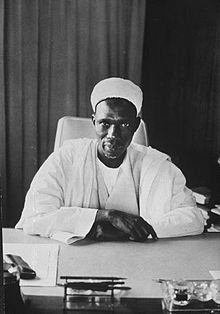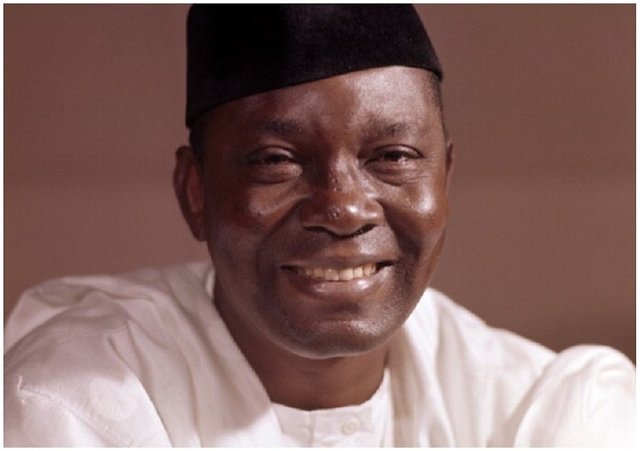Nigeria Independence; First Republic
At independence, Dr. Nnamdi Azikiwe, who gave up his premiership of Eastern Nigeria in 1959 in to lead his party at the federal level, was sworn in as the first indigenous Governor-General in place of outgoing British incumbent Sir James Robertson, Chief Awolowo also gave up his premiership in the West in 1959 to lead
his party at federal level. His party did not join in the coalition government at the centre and he emerged as the Leader of the Opposition in the Federal Parliament. But the Sardauna of Sokoto, who did not give up his premiership of the North and who did not seek to lead his party at the federal level, remained the Premier of the Northern Region.

In the West, Chief Akintola, who was the Deputy Leader of the Action Group, became the Premier of the Region rom 1959, while in the East the Deputy Leader of the NCNC, Dr. Michael Okpara, became the Premier. And so, when the independence of Nigeria was ushered in on October 1, 1960, it seemed as if the political arrangements in Nigeria had been fairly and equitably settled. Actually, a time-bomb had been buried deep into the foundation of the political edifice. So, with the passing of time, the bomb was bound to blow up the whole edifice, unless it was defused by a cautious operation of the delicate tripartition upon which the edifice was laid. While it seemed as if each of the political leaders wanted the edifice to remain intact, it could be seen that the parties in the South had hoped that the edifice would be preserved by their own progress in gathering more followership in the North.
But the NPC held the opposite view that the edifice would be preserved only if it kept the North permanently in its hands, while it sought to control the South through allies or agents. The first few weeks of independence witnessed an apparent calm in the political atmosphere of the country, which seemed to augur well for the peaceful development of the nation. Provided that those who made the laws of the land were prepared to abide by the terms of their own laws, there was reason to be optimistic that all would be well with Nigeria. At any time in the affairs of men, it is not the law that enforces itself, it is the people. If the rule of law was to prevail, the rulers of the people must be prepared at all times to live above board. They themselves have to be scrupulous in observing the law, which is the very basis for the continuity of the society,
The constitution which ushered in Nigerian independence had provided for a ruling government and an alternative government in opposition. The government was to rule according to the law, while
the opposition was to check the government. The responsibility devolved on both sides to observe "the law of the game", for the sake of fairplay and acceptability by both sides. hile excesses of the.

The first test of the sincerity of the NPC-controlled Federal Government came in March 1961, when the figures of the newly conducted census started to trickle out. The figures revealed that the South had a higher population than the North. If those figures had been accepted by the Balewa Government, the consequent re-adjustment of the Federal constituencies would have put more federal seats in the South. It would therefore have become possible for either of the parties in the South to emerge as a senior partner in any future coalition government, which could embrace even the NPC. But the NPC fumed at such a possibility and the Balewa Governmet proceeded to reject the census figures completely. It went further to schedule a recount for 1963. Thus, it was being made clear that the ruling NPC would not take kindly to any erosion of its power, no matter how legitimate the erosion might be. Also by March 1961, the Balewa Government had passed into a law, a Banking Act which was meant to strike at the basis of existence of the National Bank of Nigeria and similar banking institutions. If the law were to take effect, it would immediately destroy the National Bank of Nigeria as well as the finances of the Western Nigeria Government, which at that time was controlled by the AG, the party that was in opposition in the Federal parliament. But the aggrieved parties, the owners of the National Bank of Nigeria, went to court. Fortunately for them the federal court presided over by Justice Daddy Onyeama, ruled against the Federal Government and declared the law null and void. The National Bank was saved, and with it, all indigenous banking institutions in Nigeria. But the judiciary that gave the ruling against the Balewa Government started to be undermined, so that within the following three years, it had ceased to be a force that could stand for the right of the people in the face of an obvious governmental high-handedness and tyranny.
To listen to the audio version of this article click on the play image.

Brought to you by @tts. If you find it useful please consider upvoting this reply.